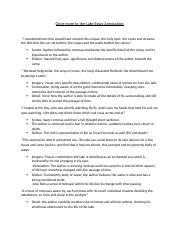

My closing paragraph restates the thesis (if necessary) and draws conclusions based on the points I have already discussed in my paper.
 I have anticipated the major objections to my thesis and have tried to address and overcome them. All my sentences directly or indirectly support my thesis statement-I have not digressed or written "off the subject." I have not contradicted my thesis statement. I have used specific, focused topic sentences to support my thesis statement. My thesis statement is a discussable point and is in the form of a declarative sentence. My subject is limited enough for adequate treatment for this length of paper. Ask yourself whether all of the following statements are true of your paper. The checklist below can help you discover whether your paper suffers from any of these errors. Inadequate or unfocused topic sentences. Six major weaknesses can doom your paper to mediocrity or worse: Does your claim hang together in such a way that an educated reader can follow it? Elegant phrasing and multi-syllable words will not make up for weakness in the development of your argument. Before you start to stress over individual words and punctuation marks, give your paper a critical read. It is a common mistake for students to want to start editing their papers before they have substantially revised them. Similarly, it is the quality of prep work-the brainstorming, prewriting, drafting, revising-that makes some papers stand out as excellent. If you fail in the prep work, the finished product will be less than excellent. Writing a paper is a lot like painting your house: the bulk of the work is in the preparation–scraping, sanding, cleaning, applying primer.
I have anticipated the major objections to my thesis and have tried to address and overcome them. All my sentences directly or indirectly support my thesis statement-I have not digressed or written "off the subject." I have not contradicted my thesis statement. I have used specific, focused topic sentences to support my thesis statement. My thesis statement is a discussable point and is in the form of a declarative sentence. My subject is limited enough for adequate treatment for this length of paper. Ask yourself whether all of the following statements are true of your paper. The checklist below can help you discover whether your paper suffers from any of these errors. Inadequate or unfocused topic sentences. Six major weaknesses can doom your paper to mediocrity or worse: Does your claim hang together in such a way that an educated reader can follow it? Elegant phrasing and multi-syllable words will not make up for weakness in the development of your argument. Before you start to stress over individual words and punctuation marks, give your paper a critical read. It is a common mistake for students to want to start editing their papers before they have substantially revised them. Similarly, it is the quality of prep work-the brainstorming, prewriting, drafting, revising-that makes some papers stand out as excellent. If you fail in the prep work, the finished product will be less than excellent. Writing a paper is a lot like painting your house: the bulk of the work is in the preparation–scraping, sanding, cleaning, applying primer. #Once more to the lake thesis how to
HOW TO STRUCTURE AN ESSAY: AVOIDING SIX MAJOR WEAKNESSES IN PAPERS








